MiNDFOOD PROMOTION
“If your skin is uncomfortable, painful, red, inflamed, itchy or stiff, your skin is trying to tell you something isn’t right. Like a window to the rest of your body, your skin is the first organ to show signs of poor health”, says Tania McKenzie – AST clinical educator and Skin Institute Appearance Medicine nurse.
HOW SHOULD HEALTHY SKIN LOOK AND FEEL?
- It should have even colour – no rough patches or red, brown or white pigmentation patches.
- Skin should feel lush, firm and plump, and be well hydrated.
- It shouldn’t feel hot, dry or oily.
- A little flush on the cheek shows a good blood supply.
- Skin should have a healthy glow – be uniform colour, have good colour and feel, and a dewy look.
WHY DOES MY SKIN CHANGE?
- Pollution: Those who live in industrial or built-up urban areas, tend to have more irritation, due to heavy metals in air pollution. This type of pollution accelerates wrinkles and age spots, and has an irritating effect on the skin which can activate inflammation that can lead to unwanted sunspots and rosacea, and deplete the collagen in the skin.
- UV light: Up to 90 per cent of skin ageing is caused by repeated exposure to the sun. Photo-ageing affects tone, colour and texture of the skin. UV-damaged cells produce free radicals that cause inflammation and result in ageing.
- Weather: The weather can affect skin hydration. For example, trans-epidermal water loss occurs when we are warm and our environment is cold.
- Lifestyle: “Smoking negatively impacts the skin in many ways,” says McKenzie. A diet high in sugar is also bad news for the skin as it can result in glycation (the sugars in your bloodstream attach to proteins to form harmful new molecules). Collagen and elastin are vulnerable to glycation which makes them stiff and brittle, and causes wrinkles” says Dr Sarah Hart, Skin Institute Appearance Medicine physician. Alcohol consumption can also cause dehydration and inflammation, and can lead to short-term and long-term changes to your skin.
- Genetics: You can’t alter genetics, but you can control what you do to the genes, for example exposing your skin to sun. “Your genetic skin type influences your risk of wrinkles and skin cancer; paler skin types are more prone to these problems in an environment with high levels of UV exposure,” says Hart.
WHAT CAN YOU DO?
“Ageing is an inevitable set of symptoms that come together to make a big picture,” says McKenzie. “If you change some of the things going into the picture, then you can change the way it looks.” If you want to slow down the ageing process McKenzie and Hart recommend the following:
- Get moving: Research shows exercise can thicken the “dermis” or second level of the skin.
- Use oral and topical antioxidants: vitamins (A, B, C, E), alpha lipoic acid (ALA), coenzyme Q-10 (CoQ-10), idebenone, polyphenols and kinetin fight damaging ‘free radicals’ in the body to reduce skin damage and collagen breakdown.
- Eat clean: Avoid processed foods.
- Protect: Using sunscreen that is relevant to your lifestyle.
- Hydrate: Nothing works well when you are dehydrated and it will show on your skin.
- Consume essential fatty acids: Enjoy foods like salmon, sardines and chia seeds.
HOW CAN SKIN INSTITUTE HELP?
Treatments are invaluable to slow down the ageing process and to promote recovery of damaged skin. Choose your treatment based on your skin type and own unique needs. Peels are great when your skin needs a boost. A peel involves removing the dead and dull skin cells, and giving the fresh cells a hydration and nutrient boost. Prescribed micro-needling such as Dermapen can increase collagen as can light-based therapies (such as IPL or laser treatments). The light-based treatments are also recommended for removing pigmentation and reducing dilated red veins. Dermal fillers are clinically proven to improve collagen levels in the skin and can also increase hydration and elasticity by depositing hyaluronan. Elasticity of skin is improved by Botox treatments.
To arrange a free 30-minute consultation with an experienced Appearance Medicine nurse, call 0800 SKIN DR or visit www.skininstitute.co.nz.







